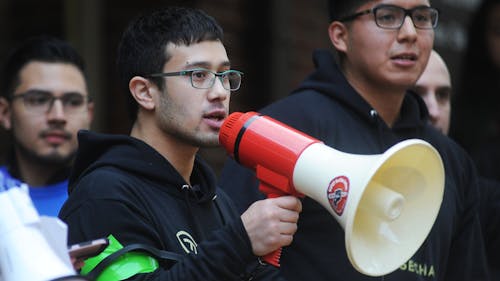Meet the organizer behind the Rutgers 'sanctuary campus' walkout

The anti-Trump protest held Wednesday afternoon at Rutgers was in sync with 100 similar "sanctuary campus" walkouts at colleges across America.
The protests were organized with help from Movimiento Cosecha — Harvest Movement— to show support for immigrant students who are fearful of President-elect Donald Trump, said Carlos Rojas Rodriguez, a member of the organization.
“We saw that students had a lot of energy after the election results, (and) we wanted to channel the energy of the students throughout the country,” he said. “We created this mission of the 'sanctuary campus,' which pushes colleges and universities to declare themselves as sanctuary states for students.”
A "sanctuary campus" would protect immigrant or minority students at a university, he said. Administrators at these institutions should assure its members that they would not cooperate with Immigration and Customs Enforcement agents or share students’ personal information with government agencies.
This personal information would include immigration status.
“We want (Rutgers administrators) to know that we think the University has a responsibility to make all its students and workers who study and work on campus feel safe,” Rodriguez said. “If we have Muslim students, black students, immigrant students who are feeling anxious because of rhetoric from politicians, then it’s hard for this to be a place of education.”
More than 130 schools signed up for the movement after the election, he said. In New Jersey, students from all three Rutgers campuses, as well as New Jersey City University and Saint Peter’s University in Jersey City walked out of classes on Wednesday.
According to CNN, protests occurred in most states in the contiguous United States, starting with students at New York University.
Rodriguez said the movement was coordinated through students and social media.
“We launched the efforts (and) local campus groups (said) they wanted to take this to their campus,” he said. “We made goals, we’ve been having conversations, we used social media (to share information).”
On Tuesday night, University President Robert L. Barchi released a statement saying Rutgers would “protect student confidentiality and will not share private information unless required by law or court order.”
Though it is a good first step, Rodriguez said this statement did not go far enough.
He is particularly concerned about the statement providing a caveat for Rutgers being legally compelled to release students’ immigration status.
“When (Donald) Trump becomes president, we don’t know what is going to be the law of the land,” he said. “We would like Rutgers to have a more solid policy that says ‘under no circumstances,’ because Trump has made it very clear what his plan for immigration is.”
Recently, Trump declared he would deport between 2 and 3 million people through his first 100 days, Rodriguez said.
If Congress passes a law requiring universities to cooperate with ICE, he said their students would remain in danger.
“You’re not solving the issue (then),” he said. “We want (University) President (Robert) Barchi to say that Rutgers is officially joining the 'sanctuary campus' movement. We have been calling for a 'sanctuary campus,' and in his statement he didn’t use the word undocumented students or undocumented immigrants. We want him to use the language that students are putting forward.”
Most of Rutgers’ revenue still comes from its students, Rodriguez said. Immigrant students who do not have scholarships or grants also pay full tuition costs, unlike many other students, so they should be allowed to continue their studies, Rodriguez said.
“I think that Rutgers’ first constituency is its students … We feel that those students should feel protected as much as (possible),” Rodriguez said. “So we’re asking Rutgers to go as far as they possibly (can) to protect those students.”
Nikhilesh De is the news editor of The Daily Targum. He is a School of Engineering senior. Follow him on Twitter @nikhileshde for more.
<label class="control-label" style="line-height: 1.99864em; color: rgb(52, 73, 94);"></label>



